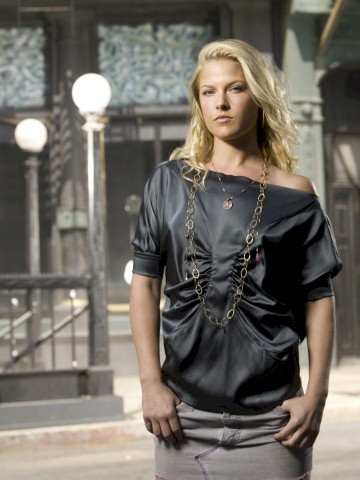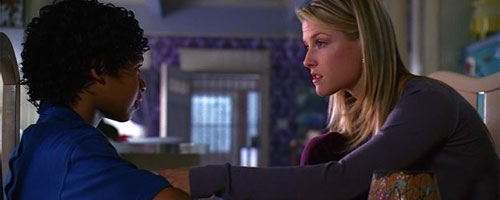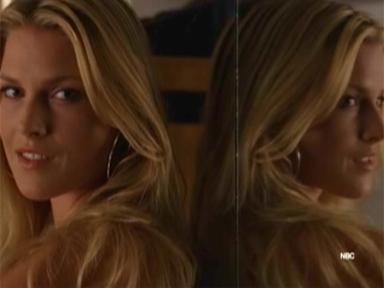Fractured Soul: Heroes’ Supermom and the Crisis of Post-Feminist Motherhood
Laura Mattoon D’Amore / Boston University

Niki Sanders, of the popular television show Heroes, is a supermom. Both a superheroine and a mother, she reflects a crisis of contemporary motherhood for women who internalized the doctrines of motherhood from past generations, but feel disillusioned by their expectations. The notion of the supermom was popularized during the 1970s, as women who struggled to “have it all” quickly realized that doing so meant taking on extraordinary burdens. While feminist rhetoric urged women to seek personal fulfillment and equality in the workplace, ideologies about women’s work, domesticity, and child-rearing did not accommodate that reality. Mothers who juggled their domestic responsibilities with work outside the home identified with the symbolism of the supermom as both empowering (mothers can do it all!) and overwhelming (mothers must do it all!). A post-feminist generation of women grew frustrated with the assumptions that they even wanted it all to begin with. Niki embodies the confusion about contemporary motherhood that makes the traditional notion of the supermom problematic.
At the beginning of Season One: Chapter Nineteen: “.07%,” Daniel Linderman narrated his reasons for collecting the paintings of Isaac Mendez. He called them “lives fixed in paint,” and described the image of Niki Sanders—her visage split down the middle to represent her as half Niki and half Jessica—as “a mother willing to fracture her own soul to protect her child.” This same logic was woven into the original supermom, as she took on dual roles in order to live up to culturally imposed expectations about the roles of mothers. Linderman believed it was this mother’s burden to bear schizophrenia for the welfare of her child. The good mother, Niki, could not co-exist with the superheroine, Jessica, because the bottom line for the two personalities was dramatically different. Niki put Micah first, always. Jessica did what needed to be done – indeed, she was so focused on her mission that she could be cruel and abusive. Jessica lamented that she was tired of “playing house,” and insisted that she would not be the “happy homemaker” forever (Season One, Ch. 15: “Run!”).1 She threatened Niki’s dream of providing a normal life for Micah (Season Two, Ch. 3: “Kindred”).2 This supermom was split in two, unable to integrate her two identities, to be both a superheroine and a mother at once. For many episodes of Season One, Niki was unaware that Jessica existed. The character perpetuated the unwieldy complication that has always plagued superhero comic books: superpowers and maternity cannot seamlessly co-exist. The social mores that govern what is appropriate behavior for mothers and the “job requirements” of the superheroine are in direct conflict: the former puts her children first, the latter eschews personal ties in favor of the greater good. It also echoes the decades long lamentation from working and single mothers, who are expected to take on so much that they “wish there could be two of them.”3

By the late 1970s, the supermom began to be “diagnosed” with “Superwoman Syndrome.” As its nickname reflects, the syndrome, likened to an ailment, involves taking on the burdens of two identities—work and motherhood. It causes stress, anxiety, and guilt for not living up to (often self-imposed) expectations. In Season Two, the director of “The Company,” Bob Bishop, told Niki that her “condition” was her brain’s way of dealing with the trauma of developing superpowers (Season Two, Ch. 8: “Four Months Ago…”). Bob’s explanation for Niki’s split personality was that she had a mental illness, and that her superpowers—her dual roles—caused a psychotic break.
This break functions as yet another metaphor for the notion of the supermom, as the psychological pressures of living up to cultural expectations present themselves similarly to schizophrenia. Some women sought therapy for their conditions as superwomen and by the late 1980s the supermom was even an obstetrical concern as women who tried to take on too much presented the need for new practices in pre- and post-natal counseling. Because Niki believed that she was sick, she took Micah to New Orleans to live with relatives and checked herself into a treatment facility (Season Two, Ch. 3: “Kindred”). “I’m sick,” she told Mohinder Suresh when he tried to release her from her physical restraints at The Company’s holding facility, “I didn’t think anyone could understand my problems… I gave up my son to be here. These are the only people who can help me” (Season Two, Ch. 5: “Fight or Flight”). She desired release from the anxiety created by her separate identities, and felt out of control.
Niki’s son, Micah, is her greatest weakness. When psychic villain Maury Parkman arrived at The Company to kill Bob Bishop, he disarmed Niki by honing in on her worst fear: Micah in danger. He also caused her to hallucinate images of her dead husband, D.L., who told her she was weak, a failure, and a bad mother (Season Two, Ch. 7: “Out of Time”).4 Superheroes are defined by their selflessness and their ability to work for the greater good. Thus one of the reasons that comic book superheroines are not mothers: their attachment to others would be too great; their love for their children could destroy them. While Niki was selfless, she was tied to her son and would sacrifice even the greater good to protect him. This impossible situation caused Niki to inject herself with the deadly mutated Shanti virus that could reverse superpowers and, eventually, kill its host. Niki injects herself to “get the nightmare out.” Symbolically, however, Niki’s self-injection affirms her desire to put an end to an identity that put Micah in danger. It enacts both the death of the superheroine and the death of the supermom, as Niki purges the side of herself that threatened the wellbeing of her child.

The post-feminist crisis of maternity is the realization that supermom does not work. Splitting one’s identity, wearing two hats, balancing separate spheres, juggling, stretching, wearing thin — none of these describe the way that contemporary mothers want to live. Today mothers have choices: they can go to college, enter professions historically dominated by men, and claw their way to the tops of corporate ladders. Are things equal? Not by a long shot. But the Women’s Movement did what it set out to do in making these types of opportunities available to its daughters. The spaces forbidden to those daughters, however, lay in the domestic realm. Whereas mothers relegated to the home at the time of the publication of Betty Friedan’s The Feminine Mystique5 did not have the option of seeking out education and employment, some of today’s mothers feel that their desire to rear children and keep house are equally culturally limited. Recent statistics suggest that women want to retreat and re-define domestic space as a locus of strength and rejuvenation rather than the prison previous generations considered it. A 2007 study conducted by the Pew Research Center found that 79% of working mothers would ideally prefer not to work full-time (80% of at-home mothers felt the same).6 Approximately two out of every three mothers with children under the age of three work, suggesting that there is a dramatic difference between how these mothers feel about ideal situations and the realities of their own lives.7) That split echoes a rift between ideology and practice and a dissatisfaction about the expectations of working motherhood. The home and its attendant responsibilities were largely represented as undesirable during the 1970s women’s movement; when mothers began desiring them, however, perhaps after having enjoyed college and a career, the meaning of supermom began to shift as well. She is still there, but she cannot automatically be assumed as identical to her origin story.
Niki-the-supermom is broken, unable to integrate her personalities: her ideals (the good mother) on one side and her job (the superheroine) on the other. Mothers today are confused by their own participation in the traditional ideologies perpetuated about motherhood, and their attraction to pop cultural representations of feminine strength and capability (particularly via the female action hero). They are pulled between so-called maternal instincts and the desire to make the most of the opportunities that the women’s movement won for them. The supermom, in original form, is dying, and Niki’s injection of the Shanti virus signifies that. But until we stop measuring motherhood by notions of “good” and “bad,” mothers will continue to develop split personalities as they try to find balance. At the end of Season Two, nothing about this supermom was certain. Niki was trapped in an exploding building, and Suresh has found the key to curing the virus. Season Three begins on September 22, and according to imdb.com, Ali Larter, the actress who played Niki Sanders, has a new character name: Tracy Strauss. Perhaps a new transformation is on the horizon.
Image Credits:
1.) Heroes’ “Supermom” Niki Sanders
2.) Niki and Micah
3.) Niki’s Split Personality
Please feel free to comment.
- Jessica makes these statements in Season One, Ch. 15: “Run!,” as justification for taking on her role as Linderman’s hitwoman. [↩]
- In Season Two, Ch. 3: “Kindred,” Niki promises Micah that they will have a normal life. Niki’s use of “normal” in contrast to hero, and “good mother” in contrast to whatever Jessica does, are recurring themes throughout both seasons. The life of the superhero—as extraordinary and often vigilante—do not resonate with Niki’s ideals about motherhood. [↩]
- In fact, in Season One, Ch. 3, D.L.’s mother affirms this connection by telling Niki: “I know what it feels like to be stretched so thin you wish there could be two of you.” [↩]
- Raymer, Patricia. “After the Liberation: The professional woman’s dilemma and The Group.” Washington Post 7 Mar. 1976: 211. and
Stotland, M.D., Nada Logan. Social Change and Women’s Reproductive Health Care:
A Guide for Physicians and Their Patients. New York: Praeger, 1988 [↩] - Friedan, Betty. The Feminine Mystique. New York: Norton, 1997. [↩]
- Pew Research Center. “Fewer Mothers Prefer Full-time Work: From 1997 to 2007.”
12 Jul. 2007: PEW [↩] - D.L. was killed because of Niki’s inability to control her identities. When Jessica disappeared, Gina came out—just as Bob Bishop warned might happen—and headed to L.A. “to play.” When D.L. went to L.A. to retrieve his wife, he was shot by a gangster who had taken a liking to Gina (Season Two, Ch. 8: “Four Months Ago…” [↩]
Fascinating article. I’m curious as to viewers’ reactions to Niki’s arch, particularly contemporary “supermoms”: has she generated positive or negative responses in this context? Does anyone have any insight?
I think you make an excellent argument here. There is only one small problem I have with it and that’s your assertion that Niki is schizophrenic. Schizophrenia is a disease characterized by audio and visual hallucinations and relationships with people or characters that only exist within the subject’s mind. In Niki’s case, she physically and emotionally becomes another person, Jessica. This disassociation is the symptom of a more rare disorder, formerly called Multiple Personality Disorder, and while it has been linked to schizophrenia in several studies they are very distinctly different diseases. Interestingly, MPD (or as it’s now called, Dissociative Identity Disorder) usually occurs in a patient’s early-adulthood and is spurred by a significant stressor that causes their personality to fracture… Niki is the perfect demonstration of this, since Jessica is capable of parenting Micah in a way that Niki isn’t capable. Jessica will do whatever it takes, even kill if necessary, to protect her son. This basic instinct perhaps represents the modern woman’s struggle to do what’s “right” by society for her children and what’s necessary. (It makes me think of the stigma that’s been attached to spanking in recent decades, yet when I was growing up this was a perfectly normal and respectable part of discipline.)
I really enjoyed this and think you make some interesting points. I would love to see more discussion on the subject.
Thank you for your comments, Stephanie!
That is an important distinction, and one that I was not completely aware of. Both Bob Bishop and Niki’s prison psychologist diagnosed Niki with multiple personality disorder, so your assessment is right on. Early in Season 1, schizophrenia was a possibility (since we only saw Jessica when Niki looked in the mirror), but as the season progressed it was clear that Niki was at least two distinct beings.
I hesitate to credit Jessica with the capability of a kind of parenting that Niki is not, only because I think that the ideologies they represent are distinct, and incompatible– one representing the necessity of work, and one representing the necessity of motherhood. When Jessica is motherly (and wifely), she is pretending to be Niki. The actual Jessica-persona let Micah go in Season 2. She sat idly by as Candice appeared as Niki and sent Micah on his merry way with Linderman, and then pretended with D.L, that saying “no” had been a substantial act of maternal protection. I like the differentiation that you found between the stuggle to do what is right, versus what is necessary. Niki does what is right in the way she interacts with Micah. She talks to him, not at him, she is diplomatic yet firm, and she never loses her temper. She performs ideal motherhood. Jessica tires of nurturing, and heads out to “work.” The two personalities of the supermom are in tension. Neither particularly wants to co-exist with the other.
Thank you to Sean, as well. I would also love to hear how contemporary supermoms view the Niki/Jessica (and now Tracy?) character. I found her maternal persona to be somewhat annoying. When she sits down face to face with Micah to discuss having a normal life, she panders to every steretype about the American dream. I would much prefer supermoms to shake things up, like Elastigirl at the end of The Incredibles.
From the New York Times online, Sunday:
Mothers on TV
Interesting comparison here that two pieces on motherhood on television appear around the same time though in very different forums. Also interesting to see the subjects selected and the respective analysis (however brief it is) in their respective forums.
Not having seen any of the shows except Weeds and the first season of Heroes and also taking into account the extreme brevity of Bellafante’s comments, I’m hesitant to offer much of a comparative critique but am certainly interested in others thoughts.
Some questions might be why these issues arise now not only in journalism and academic criticism of television but in television itself? What are the broader conditions of feminism and motherhood in the society at large? Hilary Clinton and Sarah Palin perhaps? Further, there are always mothers on tv as there are always families on tv, what kind of work has and has not been done specifically on motherhood on television? Where does the study of motherhood fit into the feminist and post-feminist studies or should it be an area of study unto itself?
Thank you for that link. I agree with Bellefante’s assessment of Terminator: The Sarah Connor Chronicles, being representative of the contemporary style of intensive mothering. I hope to see something longer on that subject sometime.
I think this interest in motherhood on television and in academia precedes Clinton and Palin, but it is very much a product of the 21st century. The small, but vocal contingency of well-educated women who are, for whatever reason, dropping out of the workforce in favor of at-home-motherhood are changing the way that motherhood is perceived in popular culture. There is ideological tension between working motherhood and at-home motherhood within a population of women that ten to fifteen years ago were all gearing up for high powered careers. This split has echoed loudly in media representations. There has been statistical evidence that the mommy wars and the opt out revolution have been blown out of proportion, but the ideological impact their attendant discussions have had has been much greater. It has led to mother characters on television that are unsettled, unbalanced, and disrupted by the experiences of motherhood, such as Niki Sanders, Sarah Connor, Nancy Botwin, etc. In the realm of representation and cultural ideology, that is a contemporary phenomenon.